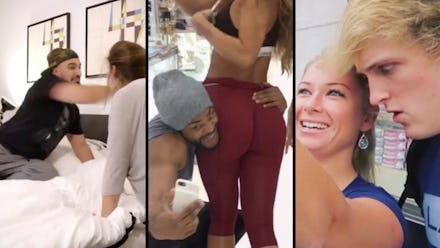These Instagram stars are being sexist, homophobic and problematic — while making money from brands

Your Instagram Explore page is probably filled with hot people making fools of themselves. It’s technically “comedy,” and it’s a lucrative business. Stars like Jake and Logan Paul, Lele Pons and Andrew “King Bach” Bachelor are collecting huge paychecks thanks to sponsorships from companies like Sprint, Snickers, Old Spice and Bic, and turning their online followings into real movie and TV contracts.
So what are these super famous people doing on Instagram that’s making them so popular? They’re dancing, pulling “pranks” on people, singing and doing comedy sketches together, and getting millions of views.
Unfortunately, a few of them are also sexually harassing and assaulting women, being homophobic, transphobic, punching women in the face and making problematic commentary on women’s bodies. These moments are all written and portrayed by actors, but they’re sending a bad message to viewers.
It’s not funny. In fact, it’s shocking, offensive and disgusting.
On King Bach’s Instagram page, you’ll also see ads for movies he’s in and sponsored content promoting the ABC show The Mayor in between comedy sketches of him hitting and touching women inappropriately.
Right now you might be asking: How is this allowed on Instagram? Well, Instagram’s Terms of Use states users are not allowed to post or engage in hate speech, self-harm or targeted harassment of an individual, but these videos don’t necessarily contain any of those things. There’s violence, hatefulness and harm, but these videos don’t appear to violate any of Instagram’s terms.
In an email to Mic, Instagram specified that the company “monitors for branded content policy violations on Instagram feed posts and Instagram Stories.” It also reviews all content through both human and automated systems to make sure it fits the company’s policies.
Clearly something’s working, because these people have millions of followers. Jake Paul has 10.2 million followers on Instagram alone, and his brother Logan has 15.8 million. King Bach has 14.7 million followers, and Lele Pons has 20.6 million.
And who are these followers? They seem to be mostly teens. Mic spoke with the people behind Jake Paul, Logan Paul and Lele Pons’ fan accounts, and they were all between the ages of 12 and 17.
Stephanie Abrams Cartin, cofounder and co-CEO of Socialfly, a marketing and public relations firm that helps connect brands to social media influencers, not including any of the stars named above, had insight into how these influencers make money. Her statistics showed that many of her influencer clients are only a little older than the teens Mic spoke with. Their biggest audiences were between the ages of 19 and 25 and most do not have a college degree.
Hannah Stocking, Bach, Pons, Logan and Jake Paul and Amanda Cerny did not respond to requests for comment about what kind of message their problematic videos send to their fans and the brands who support them. Mic reached out to the brands that have sponsored these internet celebrities and did receive statements condemning their behavior.
A representative for Bic, which worked with Logan Paul in 2016, said:
Bic engaged with Logan Paul early in 2016 to create social media content as part of a brief men’s razor campaign. Our limited engagement with him ended more than a year ago and we have no plans to work with him again. We were not aware of the inappropriate video content that ‘Mic’ shared with us. Bic condemns harassment and the incitement of violence on all levels.
Mic also reached out to cable and internet provider Xfinity, which has worked with King Bach. A representative sent the following comment:
The actions in these posts are offensive and just wrong. Bach was part of a short-term, Xfinity social campaign in early 2016 that included about 20 social media personalities who [demonstrated] product features to their followers — the test was not extended or renewed.
It turns out that some of the brands working with influencers may not even look at the influencers’ content before they agree to give them hundreds of thousands of dollars — and that could be their downfall.